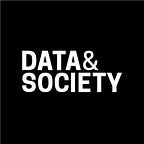Media, Technology, Politics
six new pieces on the networked public sphere
Since November 8, countless articles have been written about “fake news,” hacking, and new forms of harassment and hate speech. A group of us at Data & Society have been following these conversations with great interest because, over the last several months, we have been tracking the various ways in which old and new media can be used to shape how information flows. Our work and interest in these issues stems from a project that we’ve undertaken to understand Who Controls the Public Sphere in an Age of Algorithms?
Although many people are anxious to understand how much influence old and new media had over the US presidential election, the reality is that we will never know comprehensively. We can, though, seek to understand how different cultural and technical factors are shaping the contemporary information landscape.
To document some of our thinking, we are releasing six pieces that look at different issues that we think are important for trying to make sense of the relationship between technology and current political dynamics in the US.
- In Hacking the Attention Economy, danah boyd describes some of the tactics and strategies that people have taken to manipulate old and new media for fun, profit, and ideology. This essay explores decentralized coordination efforts, contemporary information campaigns, and cultural logics behind gaming the system.
- In What’s Propaganda Got To Do With It? Caroline Jack brings historical context to the use of the term “propaganda,” arguing that the resurgence of this label amid social anxieties over the new media landscape is reflective of deeper cultural and ideological divides.
- Did Media Literacy Backfire? by danah boyd examines how media literacy education efforts to encourage the public to be critical consumers of information may have contributed to widespread distrust in information intermediaries, complicating efforts to understand what is real and what is not.
- In Are There Limits to Online Free Speech?, Alice Marwick explores how the tech industry’s obsession with “free speech” has been repurposed (and newly politicized) by networks whose actions are often seen as supporting of hate speech and harassment.
- Why America is Self-Segregating is danah boyd’s attempt to lay out some of the structural shifts that have taken place in the United States in the last twenty years that have magnified polarization and resulted in new types of de-diversification.
- In How do you deal with a problem like “fake news?” Robyn Caplan looks directly at the challenges that companies face when they seek to address the inaccurate and often problematic content that is spread widely on social media sites.
These six pieces build on a few earlier essays as part of our work on media, accountability, and the public sphere, including:
- Gilad Lotan’s Fake News is Not the Only Problem, which outlines how bias and propaganda are often more damaging than deliberately misleading information.
- Ethan Zuckerman’s Ben Franklin, the Post Office, and the Digital Public Sphere, which explores how information infrastructures have long been wielded to move many kinds of “content.”
Taken together, these pieces begin to shed light on some of the challenging dynamics that we face as we grapple with and imagine what information looks like in a highly networked society. Democracy requires the free flow of information, informed citizens, and accountable media. What happens when the basic infrastructure of information and publics isn’t functioning as people expect and need?
We’re keen to learn from other researchers working in this area and will be hosting an intensive workshop on Propaganda and Media Manipulation. To participate, apply by February 15. We also hope to host a series of events focused on these issues for different constituencies shortly. Subscribe to the Data & Society newsletter for updates.
